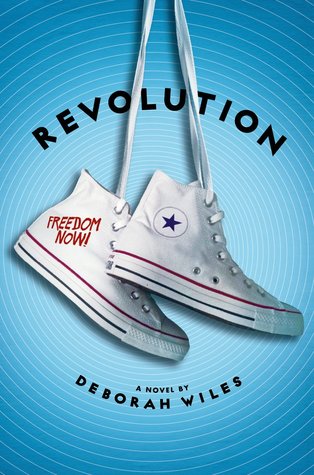I listened to the bulk of Revolution on a grueling, ten hour drive from southern Maine back to my home on Maryland's Eastern Shore. I finally crossed the Delaware Memorial Bridge and turned onto Delaware Route 1 just as the sun was setting, and the loblolly pines and marsh grass were bathed in warm, amber light. Everything felt suddenly easier, and more beautiful. "Oh man," I told my daughter. "It is so good to be back on the Eastern Shore."
That feeling - that fierce pride in one's home - is a thread that runs throughout Wiles' novel, the second book in her Sixties Trilogy. It's a feeling that unites all of the stakeholders in the turbulent summer of 1964 in Greenwood, Mississippi - "Freedom Summer" - when "invaders" from outside Mississippi mount a massive black voter registration campaign throughout the state.
As in Countdown, the reader views this particular historical moment through the eyes of children. Sunny Fairchild is a twelve-year-old white girl with a fierce love for her town - its swimming pool, its movie theatre, its library, and even its dusty courthouse. She's resistant to change, both in the town and in her own family, which has recently been invaded by a stepmother and two step-siblings.
Raymond, as a "colored" boy is, of course, barred from all of Sunny's favorite experiences, and his keen awareness of this injustice sets the plot in motion. He sneaks into the swimming pool at night on the same night that Sunny and her stepbrother have decided to go for a forbidden late-night swim. The children literally collide, and from that point forward, their paths are intertwined with one another, along with the larger stories of the Student Nonviolent Coordinating Committee (SNCC), Council of Federated Organizations (COFO), the Ku Klux Klan, and everyone else with a stake in the racial integration of the town and the state.
In her "documentary novels," Deborah Wiles begins each chapter with primary sources from the time period, including speeches, song lyrics, political slogans, and pamphlets. In the print version of the book, these take the form of a sort of collage. In the audiobook, they are presented as a sound collage, performed by a full cast. The execution is magnificent and the effect is powerful. It does, however, make me hesitant to comment on the Newbery chances of this book, because so much of my reaction to it stems from having experienced it as an audiobook. I know that Revolution affected me more powerfully than Countdown, which I read in print, and I wonder how much of that can be traced to the format.
With that caveat, I can say, with confidence, that Wiles has achieved distinction in every category mentioned in the Newbery criteria. The setting is brilliantly realized, the characters (both major and minor) are complex and vivid, and the thematic elements are handled with deftness and subtlety. Prose style is always more difficult for me to discern when I'm listening to a book, but it seemed elegant and fluid. I would love to add it to our Mock Newbery roster this year, so I can read the print edition and form a more educated opinion.
Published in May by Scholastic

No comments:
Post a Comment